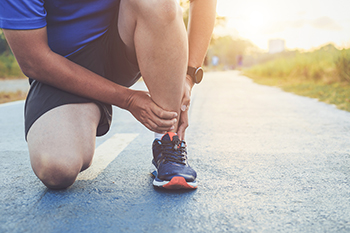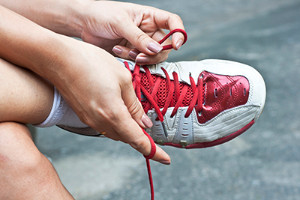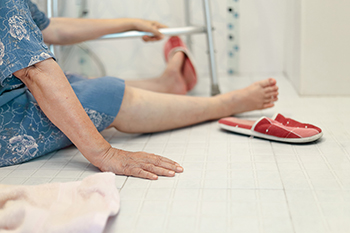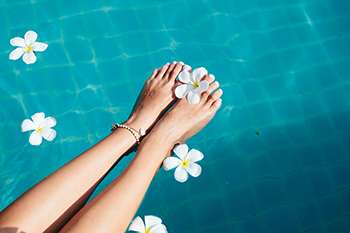Items filtered by date: July 2023
Symptoms of Tarsal Tunnel Syndrome

Tarsal tunnel syndrome is a foot condition that can be painful. The tibial nerve is found inside the tarsal tunnel, and an injury can cause this nerve to become compressed. It may also occur from having an abnormal foot structure, such as flat feet or a bone spur. The tibial nerve is located in the ankle and allows movement and feeling in various parts of the foot. The tarsal tunnel lies in the back of the inside of the ankle, and when this nerve is irritated in this narrow tunnel, tarsal tunnel syndrome can develop. Some of the symptoms that are associated with this foot condition can consist of a tingling or numbing sensation on the sole of the foot, and the toes may be difficult to move. Treatment generally begins with resting the foot and eliminating any activities that can cause discomfort. Some patients choose to wear orthotics, which may help reduce some of the symptoms. If the pain is severe and daily activities are difficult to accomplish, surgery may be an option to enlarge the tarsal tunnel. If you have this syndrome, it is suggested that you visit a podiatrist who can guide you toward the treatment that is best for you.
Tarsal tunnel syndrome can be very uncomfortable to live with. If you are experiencing tarsal tunnel syndrome, contact Donald Manger, DPM of Associated Podiatric Physicians, PA. Our doctor can provide the care you need to keep you pain-free and on your feet.
Tarsal Tunnel Syndrome
Tarsal tunnel syndrome, which can also be called tibial nerve dysfunction, is an uncommon condition of misfiring peripheral nerves in the foot. The tibial nerve is the peripheral nerve in the leg responsible for sensation and movement of the foot and calf muscles. In tarsal tunnel syndrome, the tibial nerve is damaged, causing problems with movement and feeling in the foot of the affected leg.
Common Cause of Tarsal Tunnel Syndrome
- Involves pressure or an injury, direct pressure on the tibial nerve for an extended period of time, sometimes caused by other body structures close by or near the knee.
- Diseases that damage nerves, including diabetes, may cause tarsal tunnel syndrome.
- At times, tarsal tunnel syndrome can appear without an obvious cause in some cases.
The Effects of Tarsal Tunnel Syndrome
- Different sensations, an afflicted person may experience pain, tingling, burning or other unusual sensations in the foot of the affected leg.
- The foot muscles, toes and ankle become weaker, and curling your toes or flexing your foot can become difficult.
- If condition worsens, infections and ulcers may develop on the foot that is experiencing the syndrome.
A physical exam of the leg can help identify the presence of tarsal tunnel syndrome. Medical tests, such as a nerve biopsy, are also used to diagnose the condition. Patients may receive physical therapy and prescriptive medication. In extreme cases, some may require surgery.
If you have any questions please feel free to contact our office located in Hamilton Township, NJ . We offer the newest diagnostic and treatment technologies for all your foot and ankle needs.
What Type of Running Shoe Do I Need?

It is crucial to purchase the right type of running shoes for the specific type of running that is desired. This is true of all types of runners, ranging from beginners to people who have run marathons. The most important factor to look for is a shoe that fits the foot perfectly. Each type of running shoe is designed with various features based on the activity level. Running shoes that have added motion control may benefit people who overpronate, which is when the foot rolls inward as it strikes the ground. These types of shoes tend to be stiff and can provide the necessary support as running is practiced. People who enjoy running marathons may benefit from wearing shoes that have extra cushioning, as the heel consistently hits the ground. There are many different types of running shoes, and it is suggested that you confer with a podiatrist who can guide you on the best pair to purchase for your needs.
You should always make sure your running shoes fit properly in order to avoid injury. For more information, contact Donald Manger, DPM from Associated Podiatric Physicians, PA. Our doctor can provide the care you need to keep you pain-free and on your feet.
Choosing the Right Running Shoe for Your Foot Type
Improper shoe sizing can cause a myriad of problems for your feet. Shoes that don’t fit you properly can lead to muscular imbalances in your body, which can result in foot, knee, and hip injuries.
Tips for Finding the Right Running Shoe
- Make sure you have a thumb’s width of wiggle room between the end of your longest toe and the front of the shoe.
- There should be little to no slipping at the heel
- Don’t assume your size in one shoe brand will be your size in another
- Do not lace up your shoes too tightly
- Walk around in the store with your new shoes before you buy them
If you have any questions please feel free to contact our our office located in Hamilton Township, NJ . We offer the newest diagnostic and treatment technologies for all your foot and ankle needs.
Are You Suffering From Ingrown Toenails?
Ways to Help Prevent Falling

Studies show that falling is the No. 1 cause of injury-related deaths in people ages 65 and older. Experts believe that it may be possible to help prevent falling by addressing three concerns. They are weak stabilizer muscles, poor core strength, and balance problems. Strengthening stabilizer muscles in the hips and core muscles in the abdomen improves the ability to stand up and move. Balance, reflexes and coordination diminish over time, which makes it easier to trip and reduces the ability to catch yourself if you do. Staying active is a good way to prevent falling, as a sedentary lifestyle further weakens the muscles. Performing a series of exercises to rebuild the strength in weakened muscles can help. In addition, exercises to improve balance can help with stability. Falls also may be caused by other physical ailments, such as arthritis, peripheral neuropathy, and vision problems. Any of these conditions can further increase the risk of falling. For guidance and information on suitable methods to help prevent falls, it is suggested that you consult a podiatrist.
Preventing falls among the elderly is very important. If you are older and have fallen or fear that you are prone to falling, consult with Donald Manger, DPM from Associated Podiatric Physicians, PA. Our doctor will assess your condition and provide you with quality advice and care.
Every 11 seconds, an elderly American is being treated in an emergency room for a fall related injury. Falls are the leading cause of head and hip injuries for those 65 and older. Due to decreases in strength, balance, senses, and lack of awareness, elderly persons are very susceptible to falling. Thankfully, there are a number of things older persons can do to prevent falls.
How to Prevent Falls
Some effective methods that older persons can do to prevent falls include:
- Enrolling in strength and balance exercise program to increase balance and strength
- Periodically having your sight and hearing checked
- Discuss any medications you have with a doctor to see if it increases the risk of falling
- Clearing the house of falling hazards and installing devices like grab bars and railings
- Utilizing a walker or cane
- Wearing shoes that provide good support and cushioning
- Talking to family members about falling and increasing awareness
Falling can be a traumatic and embarrassing experience for elderly persons; this can make them less willing to leave the house, and less willing to talk to someone about their fears of falling. Doing such things, however, will increase the likelihood of tripping or losing one’s balance. Knowing the causes of falling and how to prevent them is the best way to mitigate the risk of serious injury.
If you have any questions, please feel free to contact our office located in Hamilton Township, NJ . We offer the newest diagnostic and treatment technologies for all your foot care needs.
The Summer Months and the Feet

Many people enjoy the summer months, despite the fact that this time of year can cause damage to the skin on the feet. This can be a result of excessive humidity, non-supportive shoes, and UV damage. There are effective methods to protect the skin during all seasons of the year, and this begins with practicing everyday foot care. Cracked heels may be prevented when the feet are washed and dried daily, followed by applying a good moisturizer. Additionally, many people may find it helps to soak their feet in Epsom salts, which can be useful in exfoliating dead skin. Protecting the feet with appropriate sunscreen can block damaging UV rays, possibly helping to eliminate sunburned feet. Additionally, it is beneficial to change socks frequently during the hot summer days, which can help to limit bacteria and bad foot odor. If you would like more information about effective foot care routines, it is suggested that you contact a podiatrist who can provide you with the knowledge you are seeking.
Everyday foot care is very important to prevent infection and other foot ailments. If you need your feet checked, contact Donald Manger, DPM from Associated Podiatric Physicians, PA. Our doctor can provide the care you need to keep you pain-free and on your feet.
Everyday Foot Care
Often, people take care of their bodies, face and hair more so than they do for their feet. But the feet are a very important aspect of our bodies, and one that we should pay more attention to. Without our feet, we would not be able to perform most daily tasks.
It is best to check your feet regularly to make sure there are no new bruises or cuts that you may not have noticed before. For dry feet, moisturizer can easily be a remedy and can be applied as often as necessary to the affected areas. Wearing shoes that fit well can also help you maintain good foot health, as well as making it easier to walk and do daily activities without the stress or pain of ill-fitting shoes, high heels, or even flip flops. Wearing clean socks with closed shoes is important to ensure that sweat and bacteria do not accumulate within the shoe. Clean socks help to prevent Athlete’s foot, fungi problems, bad odors, and can absorb sweat.
If you have any questions please feel free to contact our office located in Hamilton Township, NJ . We offer the newest diagnostic and treatment technologies for all your foot and ankle needs.

